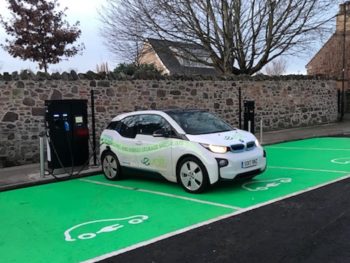Government doubles funding pot for on-street charge points to £10m
The Government has doubled funding for charge points for residential streets; underlining plans to “make electric cars the new normal”.

The Government said it’s doubling funding for charge points on residential streets to “ensure postcode plays no part in how easy it is to use an electric car”
Announced as the Department for Transport also reveals plans to increase access to real-time charge point information, the move will see council funding for charge points increased to £10m, ensuring a further 3,600 on-street charge points go live next year.
It’s only five months since the Government announced plans to double the funding to £5m, used for its on-street residential charge point scheme. The scheme launched in 2017 and helps local authorities install on-street charging infrastructure to enable EV take-up by drivers without off-street parking; according to figures 50% of drivers park on-street at night.
Last summer also saw the Government reveal plans to invest £37m in new charging innovations for people without access to off-road parking while Boris Johnson said during the election campaign that a future Conservative government would ensure every household was within 30 miles of an electric vehicle charging point through a £500m investment in a fast-charging network.
Commenting on today’s announcements, Transport Secretary Grant Shapps said: “We want to make electric cars the new normal, and ensuring drivers have convenient places to charge is key to that.
“By doubling funding again for charge points on streets where people live and opening up data we are helping drivers easily locate and use affordable, reliable charge points whether at home or on the road.”
It’s not just charging that’s on the Government’s agenda though and it’s also planning to make sure drivers can easily access real-time information about places to charge their electric car; the UK has more than 24,000 publicly available charge points, equating to one of the largest charging networks in Europe.
To help facilitate access to charging, the Department for Transport is to look into ways of making real-time information available on whether charge points are in working order and currently in use. This data could then be used by developers and incorporated into sat navs and route mapping apps. This follows the 2011 development of the National Chargepoint Registry (NCR), which is an open source of data for all public charge points. All publicly funded charge points are already required to be uploaded onto the NCR, but the Government now aims to ensure information on all public charge points is released.
And the Government is also looking to open up charge point access, as shown by its call last July for all new rapid and higher-powered charge points to offer contactless card payments by spring 2020 and for industry to develop a roaming solution across the charging network, allowing electric vehicle drivers to use any public charge point through a single contactless payment method without needing multiple smartphone apps or membership cards. It’s also said it’s prepared to intervene to ensure by using powers in the Automated and Electric Vehicles Act if developments don’t go ahead.
Today’s announcements have been welcomed by charging firm Elmtronics. CEO Dan Martin commented: “Funding private sector innovation and encouraging further investment is one of the best ways to drive the stimulation of technologies that will help make charging easier and safer.
“The reduction in plug-in hybrid models but the steady increase in fully electric vehicles [see latest SMMT figures here] show that electric vehicles are starting to be used as a real-world sustainable transport method and not just a personal money-saving mechanism.
“Concerns over reliable and readily available high-powered charging infrastructure still ranks as a barrier to plug in vehicle uptake, however the UK charging infrastructure is increasing at a lightning pace and the access to reliable charging points has never been easier.”

















